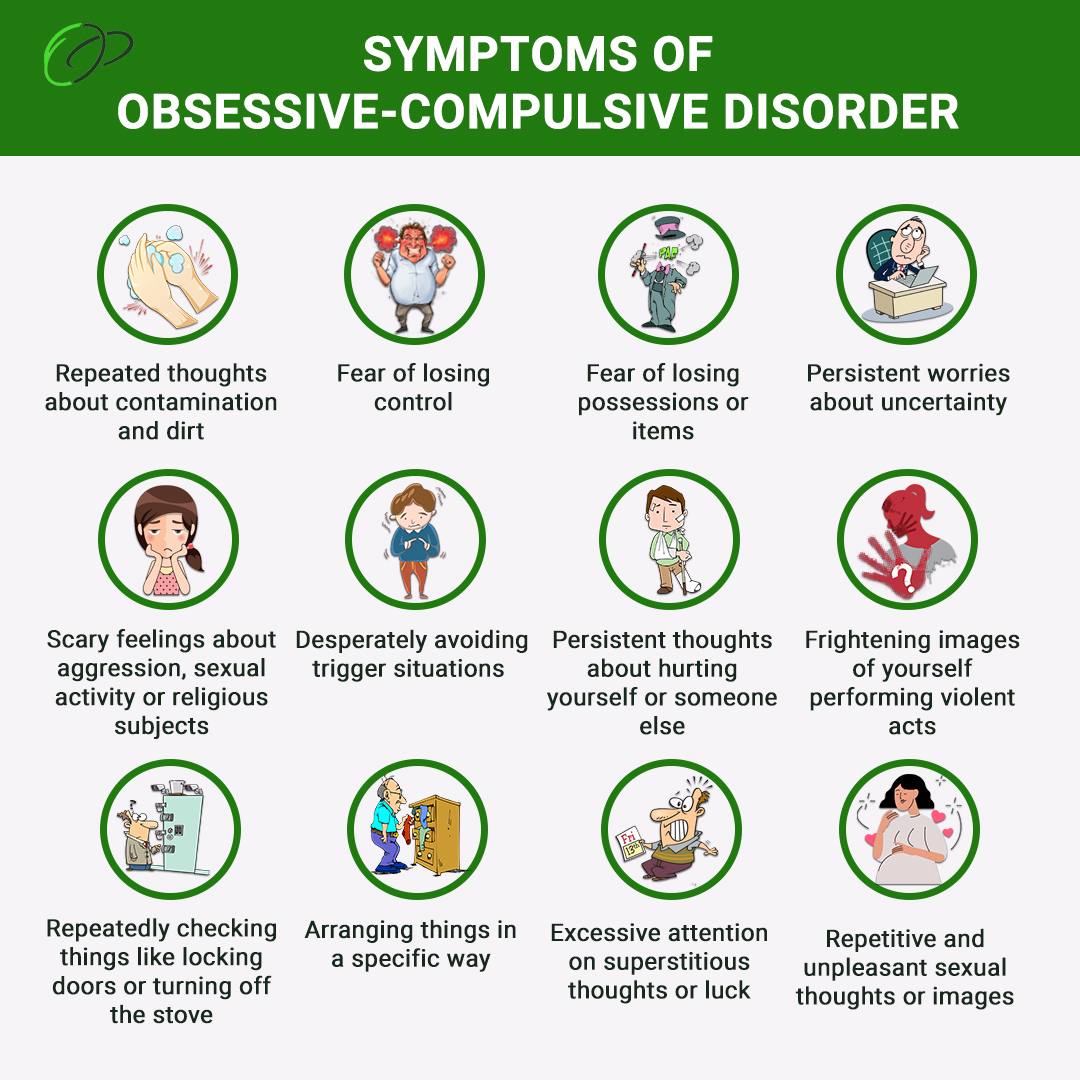

Obsessive-compulsive disorder (OCD) is frustrating and even debilitating for those who suffer from it. Our team of OCD therapists utilizes targeted FDA-approved medications to help you free yourself from the burdens of the OCD cycle without any adverse effects on your overall well-being. If you are looking for "ocd therapy near me," make an appointment with Online Psychiatrists, we provide our services in NYC, NJ, and Florida, as well as affordable online counseling services. Dr. Zlatin Ivanov is one the best therapists and has extensive training and experience in treating you through psychotherapy, including a type of CBT known as exposure therapy and response prevention (ERP). OCD treatment in NYC opens the way to a healthier and happier life. Call today for an appointment.
Obsessive-compulsive disorder causes intrusive worrying that leads you to repeatedly perform certain behaviors to reduce your anxiety and stress. Despite your best efforts to ignore these thoughts and focus on other, more productive, or enjoyable activities, you feel obligated to complete those repetitive tasks and ritualistic behaviors.
You’re not alone in your condition, and you needn’t feel shame or embarrassment about your compulsions. In fact, more than two million Americans suffer from Obsessive-compulsive disorder. But effective obsessive-compulsive disorder treatments are available.
Online Psychiatrists in New York, Florida, or New Jerseywelcomes adults between 19 and 65 years of age. A dedicated psychiatrist who specializes in treating OCD cases offers in-person treatment and remote telepsychiatry and videopsychiatry sessions if you prefer to avoid the travel and receive online OCD therapy in the comfort of your own home.
Most people experience disturbing or nagging thoughts on occasion, but if you suffer from Obsessive-compulsive disorder, the thoughts begin to haunt you. Once you start thinking about something, you can’t stop. For example, you may become fixated on simple questions, such as:
With OCD, these thoughts become obsessions that lead to repetitive behaviors or compulsions that interfere with your daily life. You end up with two choices, neither of which are helpful:
To fight OCD tendencies, you must learn to differentiate between a conscientious desire for perfection and an endless thought that you can’t shake. The people close to you have probably pointed out the difference countless times.
Those diagnosed with Obsessive-compulsive disorder usually battle both intrusive thoughts and repetitive actions, but occasionally, you only experience one or the other. Untreated, these thoughts and behaviors can take up inordinate amounts of time and energy. You may require treatment for OCD if your symptoms cause you distress. Symptoms include:
Some people suffering from OCD often perform complicated, ritualistic behaviors to overcome the anxiety these intrusive thoughts and images produce. Common behaviors include:
Obsessive-compulsive disorder symptoms often begin in teens and young adults, although young children can also exhibit signs of OCD. The symptoms tend to start slowly and grow over time or as a response to stress. Recognizing your symptoms is the first step.
 ★★★★★
★★★★★
I have been dealing with OCD for the better part of my life and I can honestly say that the treatment plan that Dr. Ivanov developed for me has been life-changing. Thank you very much for everything!
Harvard Certified
Nationally Recognized
Book AppointmentIt’s unclear exactly why anyone develops OCD. Genetics, upbringing, and environment seem to play a part. OCD can occur alone or in tandem with other mental health disorders, such as:
During your evaluation at our well-equipped OCD and anxiety treatment center, your doctor gives you a thorough physical exam, followed by a psychological evaluation that may include questioning members of your family and close friends. Whatever your issues are, be open and forthright with your therapist.
Are you looking for effective treatment for OCD? Choose an expert psychiatrist who uses both psychotherapeutic and pharmacological approaches, combining evidence-based procedures and specific cognitive interventions.
Consider using the following guidelines for finding a medical professional in your area:
The team at Online Psychiatrists is dedicated to helping individuals cope with and change problematic thoughts, behaviors, and emotions. Our OCD therapists offer evidence-based treatments like Cognitive Behavioral Therapy (CBT) with Exposure and Response Prevention (ERP) as well as antidepressant medication such as Selective serotonin reuptake inhibitors (SSRIs). Dr. Zlatin Ivanov has decades of experience and is specially trained to provide high-quality, compassionate care with the goals of reestablishing your thought patterns, eliminating or significantly reducing anxiety, discomfort, or fear, and helping disengage from the rituals.
Once you’ve been diagnosed with OCD, talk to your therapist about effective treatment to prevent your symptoms from becoming debilitating. Your psychiatrist may decide on an obsessive-compulsive personality disorder treatment that involves both medication and psychotherapy. The best treatment for OCD is typically a form of cognitive behavioral therapy combined with FDA-approved OCD medicine.
Medications can effectively control OCD. The first meds prescribed for OCD are SSRIs, including:
These medications influence different chemical messengers in the brain to help brain cells communicate more effectively, and work best when paired with CBT.
TCAs such as Clomipramine (Anafranil) may be used if SSRIs do not help improve OCD. TCAs are older than SSRIs, but they work in the same way by changing serotonin neurotransmission in the brain and helping with stress, attention, emotions, and behavior control.
According to a study published on PubMed, patients who took Clomipramine report about a 40% to 50% reduction in their symptoms.
If SSRIs alone do not alleviate your symptoms, your specially trained mental health therapist may try combining them with TCAs. Tell your therapist about any medications you’re currently taking to prevent any adverse reactions or side effects.
Don’t stop taking your antidepressants without informing your therapist because you may experience withdrawal symptoms.
Psychotherapy often relies on cognitive behavioral therapy (CBT). CBT incorporates exposure and response prevention, which desensitizes your anxieties and fears. Your therapist teaches you ways to resist your compulsive urges. Gradually, you’re exposed to things that used to bother you the most. Learning to manage your thoughts and behaviors puts you back in control of your life.
When it comes to treating OCD, therapy is the first line of defense. Exposure and Response Prevention (ERP), a specific form of CBT, is the most effective treatment option.
The idea behind ERP is to create discomfort and work through it with the help of a clinical psychologist who specializes in treating OCD cases. Exposure therapy starts by exposing you to objects and circumstances that provoke anxiety, but one that you can bear. You will notice that your anxiousness does not rise as high and does not linger as long after the first few times. After that, you'll go to increasingly challenging exposure exercises.
Under the guidance of thoroughly trained specialists, patients undergoing ERP therapy can gradually minimize their anxieties and break the OCD cycle. ERP is a highly effective treatment for many patients suffering from OCD, and according to a study published on NCBI, up to half of those who receive ERP as a monotherapy or in combination with medication would report reduced symptoms after just one treatment.
To say free of limits imposed by insurance companies, our doctors and therapists are not members of any insurance panels. You can, however, call your insurance company to see whether you have coverage for out-of-network providers (PPO insurance). You may be able to get a portion of the cost of therapy reimbursed if your insurance plan covers out-of-network benefits. Furthermore, you may want to discuss the necessity for specialized OCD treatment in the form of exposure and response prevention (ERP) to determine whether a higher rate of reimbursement for services is available.
For treatment-resistant cases, other options may include intensive outpatient or inpatient programs, transcranial magnetic stimulation (TMS), or deep brain stimulation (DBS). Our OCD doctors determine which treatment option is right for you. Contact Online Psychiatrists in NYC, NJ, and FL today and get on the road to recovery.

Dr. Zlatin Ivanov, MD, is an adult psychiatrist specializing in addiction treatment, ADHD, anxiety, depression, and OCD. He offers exceptional talk therapy and medication management through online video conferencing.
Dr. Ivanov is double board certified in Psychiatry and Clinical Neurology and a member of the American Psychiatric Association. His medical career is colored by many outstanding contributions to medicine, including several publications, research, and scientific presentations. An attending psychiatrist at Woodhull Medical Center in Brooklyn, NY, and Bellevue Hospital Center in New York City, he takes the time to listen to patients and makes sure they know he is committed to their unique situation.
 Our Locations
Our Locations
The Chrysler Building
405 Lexington Ave, #2601
New York, NY, 10174 (map)
300 Carnegie Center Drive #150K,
Princeton, NJ, 08540 (map)
701 Brickell Avenue, 1550#A,
Miami, FL, 33131 (map)